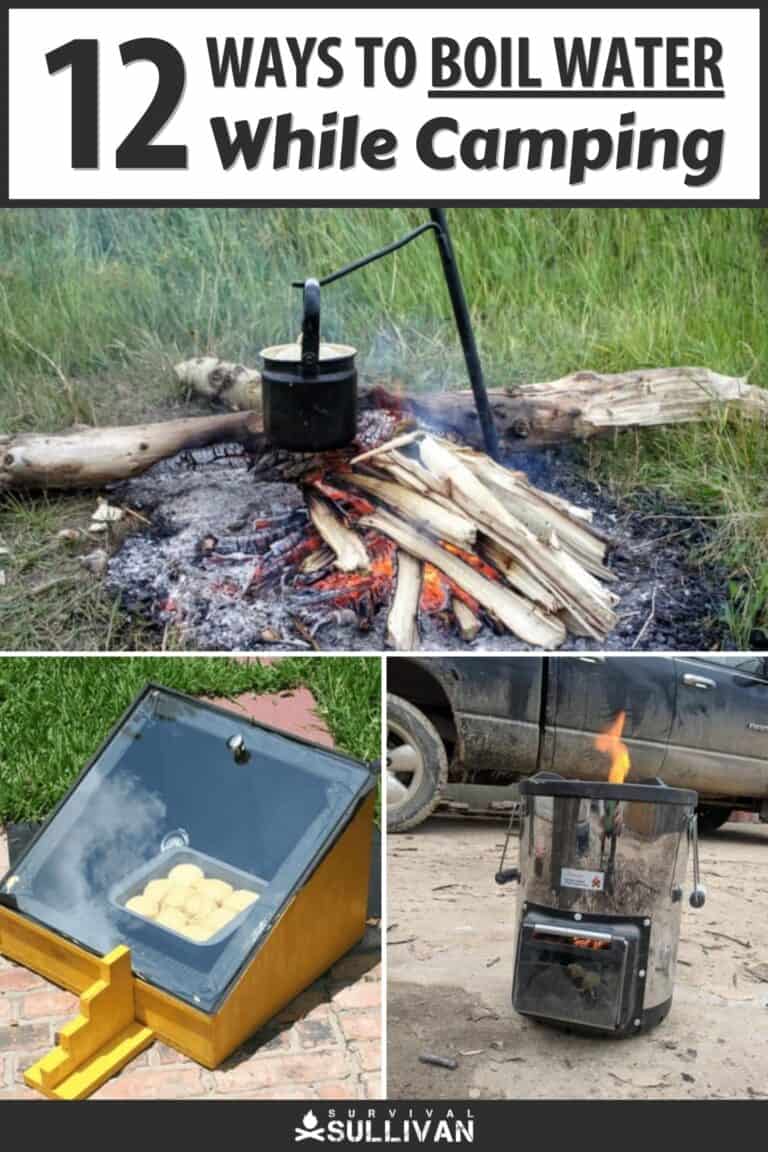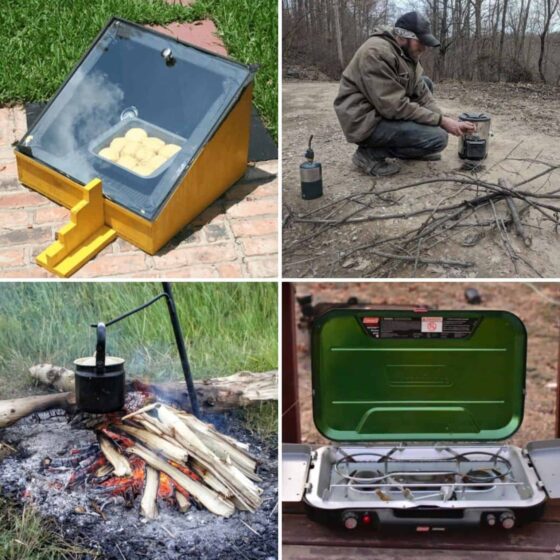
If you’re going out outdoor camping, for any reason, you need to have the ability to boil water when needed.
You need to purify any that you find while in the field before you consume it, and with the expansion of freeze-dried outdoor camping meals and rations, boiling water is usually needed for preparation.
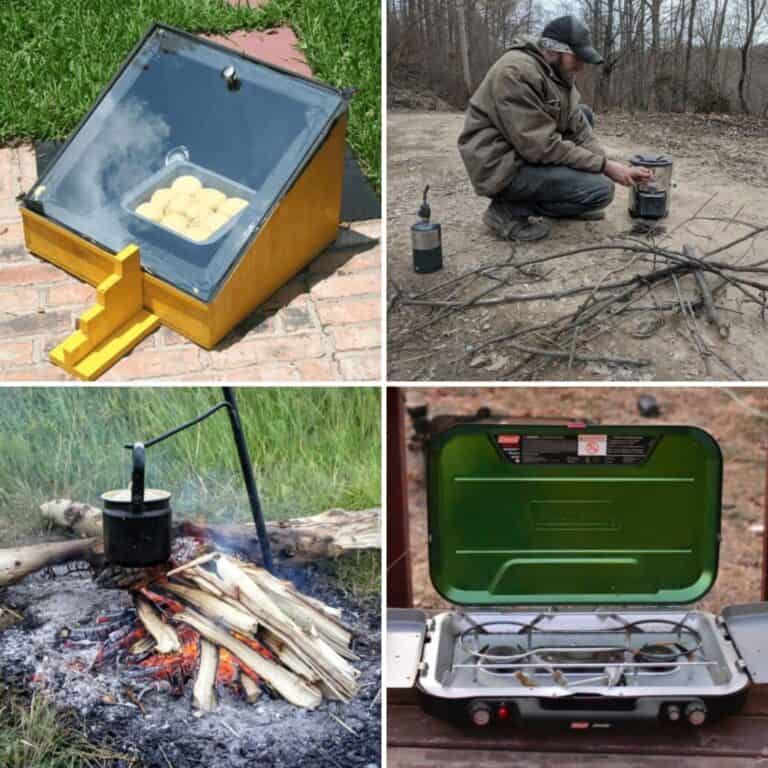
You can always set a kettle or pot over the campfire, that’s one way to do it, however there are lots of other methods besides. In this post, I’ll inform you about 13 methods to boil water while you’re out outdoor camping. Get your pack and let’s start … 1. Solar Oven For those who enjoy leaving no trace and have a lot of time to wait, solar ovens can be a surprisingly effective technique for boiling water.
This environmentally friendly cooking tool harnesses the endless power of the sun to heat water, making it a perfect option for clear, sunny days.
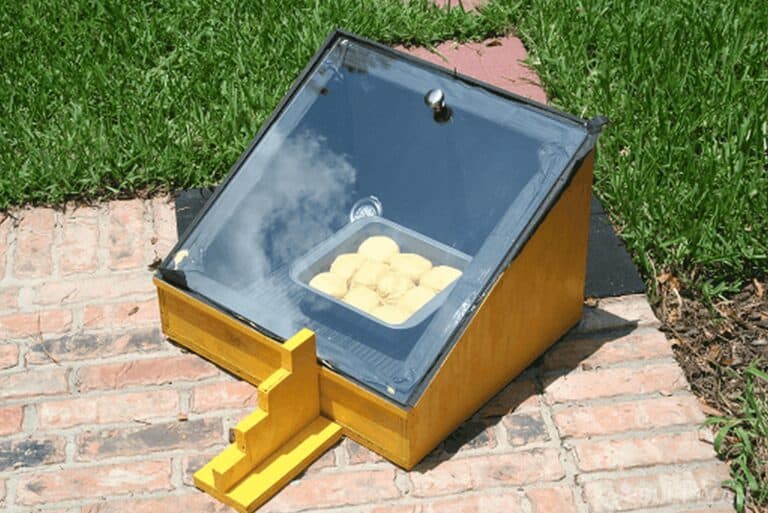 small DIY solar oven with tray of cookies baking inside Nevertheless, it’s important to keep in mind that in cloudy or non-ideal climate condition, boiling will take a lot longer- if it is possible at all!
small DIY solar oven with tray of cookies baking inside Nevertheless, it’s important to keep in mind that in cloudy or non-ideal climate condition, boiling will take a lot longer- if it is possible at all!
Solar ovens are, naturally, worthless during the night or under a thick canopy. While some styles aren’t very portable due to their size and weight, there are compact versions offered.
But bear in mind, these portable styles typically jeopardize substantially on efficiency, suggesting you’ll need more ideal conditions for efficacy.
So, while a solar oven may not be the quickest way to boil your water, they are a feasible, fuel-saving option.
2. Campfire
Certainly the most time-tested way of boiling water at camp, the campfire is as versatile as it gets when it comes to boiling water while camping.
Whether you’re using a cup, mug, kettle, or pot, a well-tended campfire can supply more than enough required heat in any conditions.
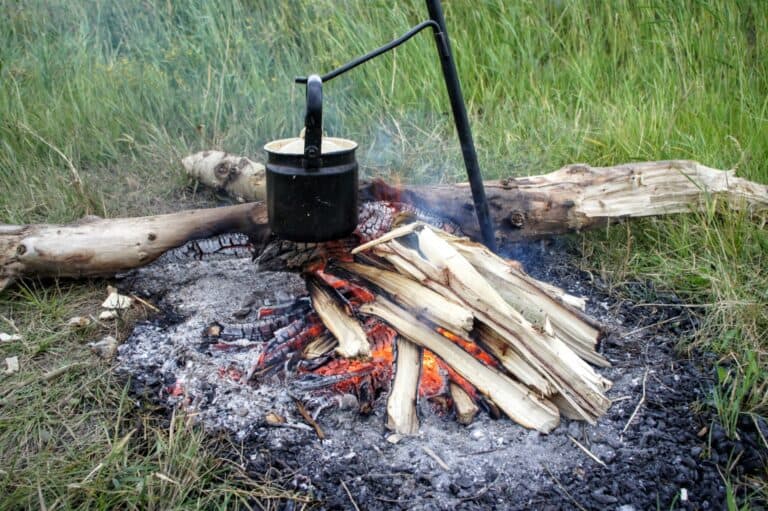
However, a great fire does require a substantial amount of fuel and regular tending. This indicates you’ll need to keep a great supply of wood on hand and continuously monitor
your fire. Despite this, if you’re already using a campfire for heat and light, it becomes the de facto and highly-efficient option for boiling your water.
And as constantly, the heat of a crackling fire certainly adds to the general outdoor camping ambiance, so it gets my vote!
3. Camp Range
When it concerns benefit and speed, a common camp stove is difficult to beat. These useful devices are not just simple to bring (generally) due to their compact design, they’re likewise easy to establish, making them a favorite among many campers, especially those that are treking long distances.
If you do not have a stove you can still boil water, simply examine our guide on boiling water without a range for alternatives.
Generally, camp ranges heat water pretty fast, minimizing the waiting time for that much-needed cup of coffee or hot meal.
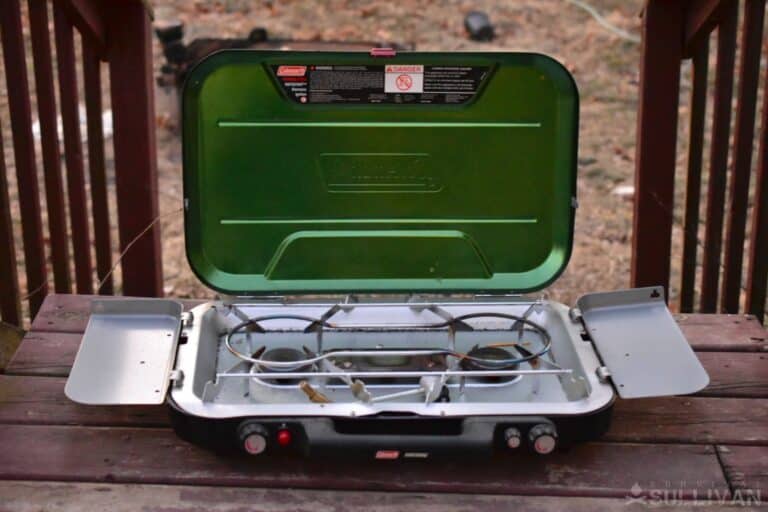
A 2-burner Coleman gas camping range. The only hitch is that they need a devoted fuel container, which means bring extra weight and bulk
. Nevertheless, some models on the market make use natural fuel in the form of branches, leaves and sticks as fuel, using a more versatile and lightweight choice.
Despite the requirement for a particular fuel source, a camp stove’s portability and efficiency make it a popular option for boiling water while camping.
4. Charcoal Grill
If you’re planning a major cookout, long-term campsite, or camping at a site with set up charcoal grills, then the modest charcoal grill is an excellent, reputable alternative for boiling water.
Capable of maintaining constant heat, these grills can boil the water while you grill your food for included effectiveness.
Although charcoal is the primary fuel source for these grills, alternate fuels like wood or even certain biomass briquettes can be used, offering some flexibility.
If you’re going all out on your camping journey or have a grill set up close by, a charcoal grill uses a multifunctional solution for your cooking and water-boiling requirements without any electricity or require to build a fire.
5. Rocket Range
For a super-efficient and fast approach of boiling water, look no more than the rocket stove. Rocket stoves are an idea more than a design of stove, as you can make your own in the wild or purchase a commercially-produced design to take with you.
When it comes to the latter, these ranges use (typically) small-diameter sticks and branches which are burned in insulated combustion chamber that draws air in from the opposite side, producing an even hotter flame.
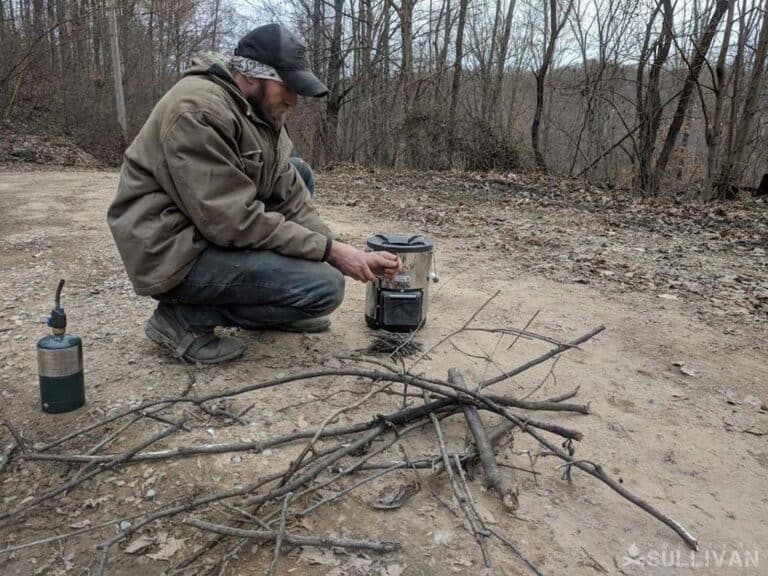 using a portable rocket range in the woods The result is a hotter, more efficient burn, even with minimal fuel. These ranges have the advantage of boiling water very rapidly while using common natural fuel. But, you can make your own rocket stove with multiple holes went into the ground, offering the very same advantages and a flexible technique to outside cooking and boiling.
using a portable rocket range in the woods The result is a hotter, more efficient burn, even with minimal fuel. These ranges have the advantage of boiling water very rapidly while using common natural fuel. But, you can make your own rocket stove with multiple holes went into the ground, offering the very same advantages and a flexible technique to outside cooking and boiling.
If you’re looking for a quick, fuel-economical solution, the rocket range might be your response.
6. Jetboil
When it concerns boiling water ASAP (or as my granddad utilized to state, “when you require it done the other day!”), the Jetboil is the standout way to do it.
This specialized camp stove is designed for one job, boiling water, and it’s a job it excels at. Most of the times, a Jetboil will get your water to a quick boil in as low as 90 seconds.
Some models even provide precision temperature control for your specific requirements and fuel economy.
However, like all such stoves Jetboils require a dedicated fuel source, which implies bring a little extra gear. Likewise, compared to common stoves, the Jetboil is substantially more expensive.
However for numerous, the speed, performance, and convenience that this range provides make it worth the financial investment if you simply need your range to boil water.
7. Internal Flame Kettle
Internal flame kettles are a fairly distinct piece of outdoor camping equipment developed particularly for field usage, and a type that’s been around a while.
They include an unique chamber where the flame is developed straight below the water compartment.
This enables you to use common fuel for boiling water without the requirement for building a dedicated campfire, making them highly useful and effective.
The drawback, however, is that these kettles can be heavy and bulky contraptions, and are a discomfort to bring.
In spite of this, their performance and benefit make them a strong choice for those who prefer a more conventional, yet effective method of boiling water while camping.
8. Electric Camping Kettle
For those who take pleasure in the conveniences of contemporary conveniences even while outdoor camping, an electrical camping kettle may be the perfect fit.
Long the calling card of the “glamper,” these devices are extremely simple to utilize and provide the benefit of quick, effective boiling.
Just plug and play, actually! Nevertheless, they do, naturally, need a substantial amount of electricity. Accordingly, they are best fit for RV outdoor camping or campgrounds where electrical connections are offered.
A generator is another option if you’re utilizing one, and you might potentially run one off of a significant power bank with a solar charger.
However these things are such power hogs that is most likely not the very best usage of your resources.
Regardless of being electrically dependent, the speed at which these kettles can boil water makes them a popular choice for numerous campers who can utilize them, particularly those who value a fast and simple cup of coffee or tea in the outdoors.
9. 12V Kettle
A 12V kettle is an exceptional companion for cars and truck campers, offering the convenience and efficiency of a standard electric kettle above with the ability utilize your automobile’s power ports.
These kettles are developed to plug into your automobile’s 12V power outlet. This permits you to take pleasure in hot beverages or simple immediate meals (ones that need boiling water) without the requirement for a traditional campfire or range.
Among the primary benefits of a 12V kettle, like the other electrical kettle above, is its large ease of use. Just fill it with water, plug it in, and await it to boil.
This makes it a super convenient tool for those mornings in the wilderness when you’re yearning a hot cup of coffee or tea, or for those chilly nights when a warm meal can make all the distinction.
Nevertheless, while a 12V kettle can definitely be advantageous, it’s not without its significant downsides: Among the most noteworthy disadvantages is that it relies greatly on your vehicle’s battery.
If your battery diminishes, the kettle becomes useless. Worse, duplicated usage of the kettle can drain the battery over time, which could potentially leave you stranded in the great outdoors! This is particularly likely with a weak, little, or old battery.
Therefore, it is very important to monitor your battery levels carefully when using this kettle and to have a backup source of power offered.
10. Solar Kettle
For those seeking another off-grid and eco-friendly alternative, a solar kettle might be the ideal fit. As the name suggests, a solar kettle permits you to boil water for cooking or making hot drink utilizing the power of the sun.
The primary benefit of a solar kettle is shown the solar oven up above: self-reliance from traditional power and fuel sources.
This means you don’t need to worry about lacking or carrying fuel, collecting wood or draining your car’s battery.
In perfect conditions, a solar kettle also uses the benefit of a standard camping kettle.
However in less than ideal conditions, it is a non-starter: it’s generally ineffective at night, under a dense canopy of leaves, or on very cloudy days when there’s not enough sunlight to heat the water.
These are highly limiting disadvantages, particularly if you’re camping in a greatly forested location or during a time of year (or place) when sunny days are scarce.
Therefore, while a solar kettle can be a fantastic addition to your camping gear, it is a specific niche alternative. You had better have a backup prepare for those times when the sun isn’t shining.
11. Ration Heating system
The ration heating system, likewise called a flameless ration heating unit, is a water- or air-activated heating unit packet typically discovered in MREs.
These are compact and useful options for folks who need to heat small amounts of water. Its primary function is to provide a heat source for heating food packets, however they get just hot sufficient to almost boil water.
This type of heating system is developed for simplicity and efficiency: small, thin, light-weight and easy to load, they are a convenient addition to your outdoor camping equipment.
Ration heating systems run without the need for electrical energy or traditional fuels– they only need a bit of water themselves!– and they are a reputable alternative in circumstances where resources might be limited, or when you just do not have time for anything else.
However do keep in mind that its water boiling capacity is incredibly restricted: you’ll need multiple heaters to substantially heat any significant quantity of water.
While it’s adequate for cooking packaged MRE meals and beverages, it may not satisfy your needs if you need bigger quantities of boiling water.
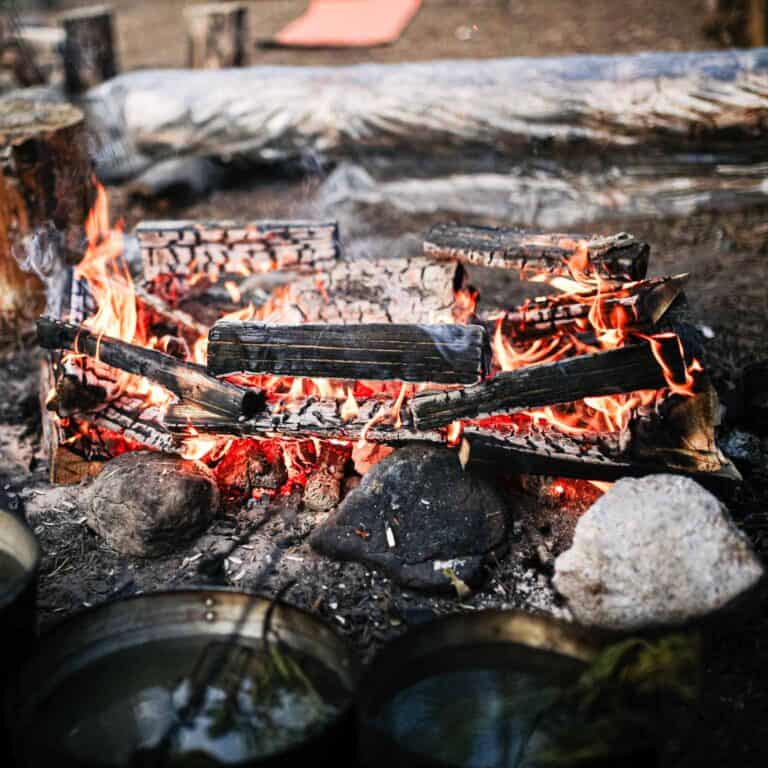
12. Hot Rocks The hot rock technique is an ancient technique that continues to show its effectiveness even today, and it’s precisely what it sounds like: heating rocks to very high temperatures utilizing a campfire (or any other source of extreme heat), then dropping them into an appropriate container of water.
The outcome is nearly instant boiling water, making this approach a fast and efficient method to boil water without the requirement for intricate tools or other devices.
One of the advantages of the hot rocks method is its flexibility. It can be utilized with a variety of containers, from modern metal pots to primitive containers made from leaves or other natural materials.
This makes it a supremely handy survival ability to have, especially if you find yourself in a circumstance where conventional boiling techniques aren’t readily available.
Nevertheless, this method does feature considerable risks. Dealing with hot rocks can be really harmful, as they can cause serious burns or begin fires if not managed appropriately.
In addition, heating moist or wet rocks can cause them to blow up, which can result in severe injuries to people close by.
Therefore, this need to be utilized with extreme caution and only when you’re experienced in dealing with hot rocks safely.
Despite these threats, this approach remains a viable choice for boiling water in the great outdoors and is a survival and sustainment skill that every, single camper needs in their collection.
Just keep in mind to always focus on security when attempting it!
